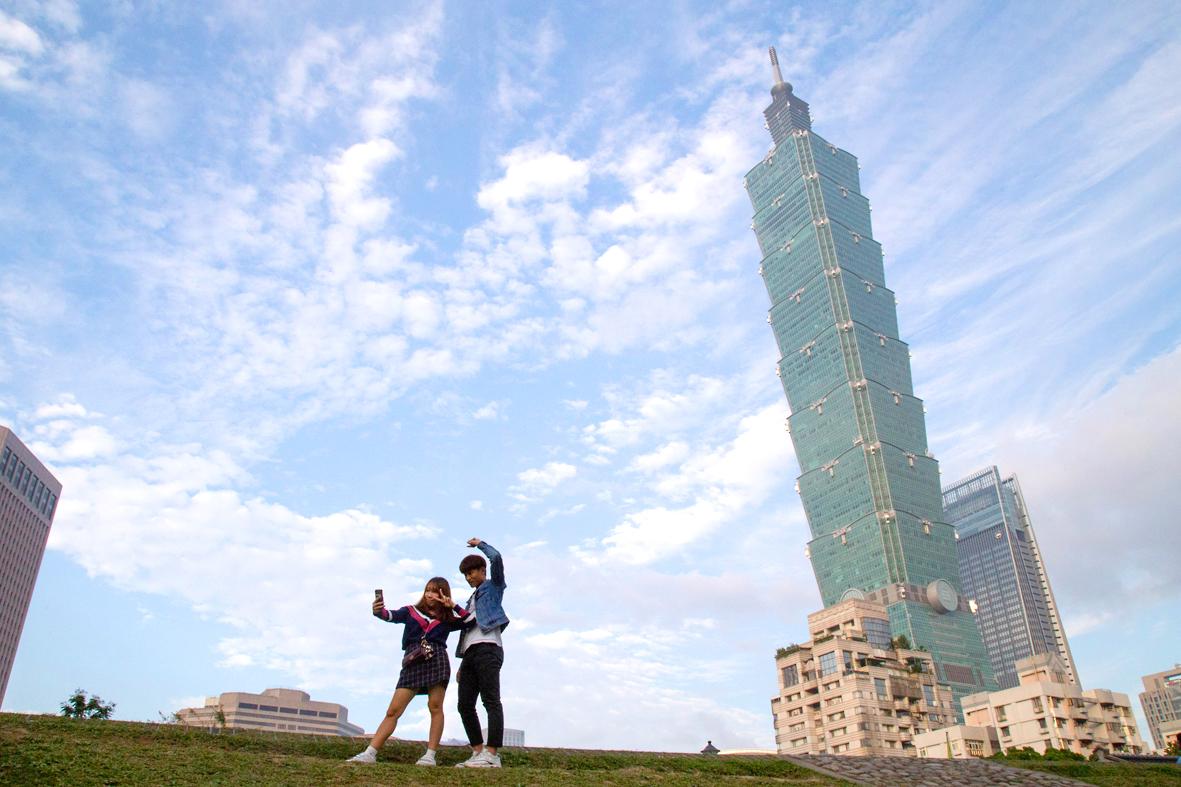Taipei 101, one of the nation’s leading shopping centers, is planning to reduce its business hours due to decreased demand amid the COVID-19 pandemic.
Taipei 101 is to open daily at noon and close at 9pm from April 6, building management said in a statement on Monday.
The shopping center has been opening at 11am and closing at 9:30pm from Sunday to Thursday, while closing at 10pm on Friday and Saturday.

Photo: Bloomberg
The restaurants in the food court — on the basement level — would adjust their business hours as necessary, but the supermarket would continue to open at 9am daily, management said.
The shopping mall is the nation’s first to cut back operations due to the pandemic, which has heavily affected business in Taipei’s Xinyi District (信義).
Taipei 101 has since February implemented measures to prevent the spread of the coronavirus, such as checking the temperature of shoppers and denying entry to those with a reading of 37.5°C or higher.
Management said that it has improved the building’s ventilation system and more frequently disinfects elevators, escalators and restrooms.
The new business hours would allow mall enterprises and brand stores to spread out employee shifts to lower the risk of COVID-19 infection, management said.
Meanwhile, other major shopping centers, such as the Far Eastern Sogo Department Store (遠東Sogo百貨) chain, the Shin Kong Mitsukoshi Department Store (新光三越百貨) chain and the Breeze Group (微風集團), said that they have no plans to reduce their business hours.
Separately, 17 Michelin-starred restaurants in Taipei that earlier this year were found to have breached sanitary regulations have all passed a second inspection, the city’s Department of Health said on Monday.
The department inspected 51 Michelin-starred restaurants in Taipei from January to March, and found that 17 of the restaurants had contravened sanitary regulations, the department said in a statement.
Inspectors found dirty equipment or ingredients on the floor, while some restaurants failed to provide the results of employee health examinations, the department said.
A second inspection showed that the offending conditions had been corrected, it said.
The restaurants with offenses were Golden Formosa (金蓬萊遵古台菜), The Restaurant (三二行館), Indulge Bistro (實驗創新餐酒館), Leputing (樂埔町), RAW, Nihonryori RyuGin (祥雲龍吟), Le Palais (頤宮中餐廳), Chi Chia Chuang (雞家莊), Tainan Tan Tsu Mien Seafood Restaurant (台南擔仔麵海鮮餐廳), Sushi Ryu (隆鮨), JE Kitchen, Sushi Amamoto (鮨天本), Shing Peng Lai (興蓬萊), Tairroir (態芮), Tien Yuan Seafood (田園海鮮), Yu Kapo (彧割烹) and Peng Lai (蓬萊), the statement said.

South Korea’s equity benchmark yesterday crossed a new milestone just a month after surpassing the once-unthinkable 5,000 mark as surging global memory demand powers the country’s biggest chipmakers. The KOSPI advanced as much as 2.6 percent to a record 6,123, with Samsung Electronics Co and SK Hynix Inc each gaining more than 2 percent. With the benchmark now up 45 percent this year, South Korea’s stock market capitalization has also moved past France’s, following last month’s overtaking of Germany’s. Long overlooked by foreign funds, despite being undervalued, South Korean stocks have now emerged as clear winners in the global market. The so-called “artificial intelligence

NEW IDENTITY: Known for its software, India has expanded into hardware, with its semiconductor industry growing from US$38bn in 2023 to US$45bn to US$50bn India on Saturday inaugurated its first semiconductor assembly and test facility, a milestone in the government’s push to reduce dependence on foreign chipmakers and stake a claim in a sector dominated by China. Indian Prime Minister Narendra Modi opened US firm Micron Technology Inc’s semiconductor assembly, test and packaging unit in his home state of Gujarat, hailing the “dawn of a new era” for India’s technology ambitions. “When young Indians look back in the future, they will see this decade as the turning point in our tech future,” Modi told the event, which was broadcast on his YouTube channel. The plant would convert

‘SEISMIC SHIFT’: The researcher forecast there would be about 1.1 billion mobile shipments this year, down from 1.26 billion the prior year and erasing years of gains The global smartphone market is expected to contract 12.9 percent this year due to the unprecedented memorychip shortage, marking “a crisis like no other,” researcher International Data Corp (IDC) said. The new forecast, a dramatic revision down from earlier estimates, gives the latest accounting of the ongoing memory crunch that is affecting every corner of the electronics industry. The demand for advanced memory to power artificial intelligence (AI) tasks has drained global supply until well into next year and jeopardizes the business model of many smartphone makers. IDC forecast about 1.1 billion mobile shipments this year, down from 1.26 billion the prior

People stand in a Pokemon store in Tokyo on Thursday. One of the world highest-grossing franchises is celebrated its 30th anniversary yesterday.